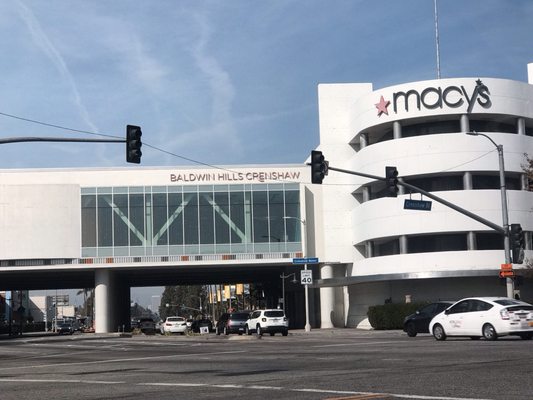Crenshaw mall’s new owners vow to honor Black culture, community
By Janice Hayes Kyser and Shirley Hawkins
Contributing Writers
LOS ANGELES — Aspiring Black entrepreneurs will gain access to start-up capital, Black and women business owners will be targeted for partnerships, and Black store owners in Baldwin Hills Crenshaw Plaza will get an ownership stake in the mall under an ambitious plan being developed by the plaza’s new owner, Harridge Development Group.
David Schwartzman, president and CEO of Harridge, also said 10% of rental units in the mixed-use development will be reserved for low-income residents, while another 10% of condominiums will be set aside for teachers, firefighters and health care workers who often are priced out of the local housing market.
“This project is so unique. There is nothing like it with its cultural significance [and with] the subway, housing and adaptive uses,” said Schwartzman, who also heads the newly formed Baldwin Hills Crenshaw Plaza Partnership. “It will be the kind of first-class project that the community deserves and that the rest of the country will be pointing to as a model of what is possible.”
Harridge’s multimillion-dollar purchase of the mall was announced Aug. 25 after a long and controversial bidding process. Asset manager DWS, which conducted the sale, said in a statement: “Harridge was selected through a fair and open sales process based upon a number of factors, including both purchase price as well as development expertise. We are excited to bring this process to a successful close for the benefit of the community.”
Many community residents, however, have expressed outrage over Harridge’s purchase of the mall. Some have consistently argued that plans to convert the 40-acre property into a high-priced, mixed-use office and residential space would price African Americans out of the market and further accelerate gentrification in the area.
Members of a community group, Downtown Crenshaw Rising (DCR), convinced two previous potential buyers to withdraw their bids, but were unable to persuade Schwartzman to drop his plans to buy the property.
Last December, community protests halted the sale of the mall to developers DFH Partners and LIVWRK. In June, the group opposed a $130 million offer from CIM Group to buy the mall. The community protested that sale because of its dealings with Kushner Real Estate Group, which is controlled by the family of Jared Kushner, the son-in-law of Donald Trump.
DCR board member Damien Goodmon and other community residents say they are disturbed that their concerns were never seriously considered by Capri Partners, the previous owners.
“Downtown Crenshaw submitted a legitimate bid … and they were very unfair to Downtown Crenshaw Rising,” Goodmon said. “They gave everybody else two or three weeks to submit their bids, but they only gave Downtown Crenshaw Rising five days.”
Downtown Crenshaw Rising raised $115 million to purchase the mall, the highest bid offered. Goodmon said Deutsche bank repeatedly refused to acknowledge Downtown Crenshaw Rising’s bid. Instead, he said it granted Schwartzman a four-week extension to come up with the full amount of funds to purchase the mall, even though the developer missed the deadline twice.
“How is it that we have a higher bid and better terms, but our bid was rejected?” Goodmon asked, adding, “We had 300 community groups and leaders backing us.”
“I definitely feel the mall’s purchase by Schwartzman is rooted in racial discrimination,” Goodmon said, adding that Downtown Crenshaw Rising had received 28,000 signatures of support. “It’s a level of unity and display of support that was unparalleled.”
Jackie Ryan, a board member of Downtown Crenshaw Rising, said she is proud of the community’s efforts to try to purchase the mall.
“We have demonstrated the ability to raise the capital to buy the mall,” she said. “This was done from people who were raised and worked and went to church in this community for generations.”
Harridge CEO Schwartzman said he spent countless hours gathering ideas and listening to the concerns of local leaders, neighborhood groups and mall tenants. He said is committed to developing a project that honors those ideas and concerns.
“The community wants to see a place that reflects their culture, and that’s what we are going to give them,” he said.
Schwartzman said he envisions a vibrant retail environment with indoor and outdoor shopping, restaurants and diverse entertainment that buoys the local economy and nurtures and promotes Black business and culture.
He also said he’ll move The Museum of African American Art from inside Macy’s to a more prominent and accessible location inside the plaza. He also promised that community events and gatherings that have been housed at the mall – like the Pan African Film Festival, Farmer’s Market, Winter Wonderland and the BFit series (Zumba, Cardio-Kick and Yoga) – will remain at the plaza and will be even bigger and better.
Jason Lombard, a consultant with Capri Partners, says Schwartzman’s approach is good for the community.
“The thing that encourages me is the way they are approaching this,” said Lombard, who recently joined the Baldwin Hills Crenshaw Plaza Partnership’s executive team. “They are coming in in a preservation mode, with the attitude, ‘Let’s keep what has been working and improve on it and create more partnerships that connect us to the community.’ I think people will see what they hoped for and expected at a very high level.”
Schwartzman says although his firm probably won’t break ground on the project for the next 15-18 months, he’s confident the community will find it worth the wait.
“It is an unbelievable project that will attract people from all over and will stand the test of time,” he said. “I have never been more excited about a real estate project in my life. I am totally vested in this.”











